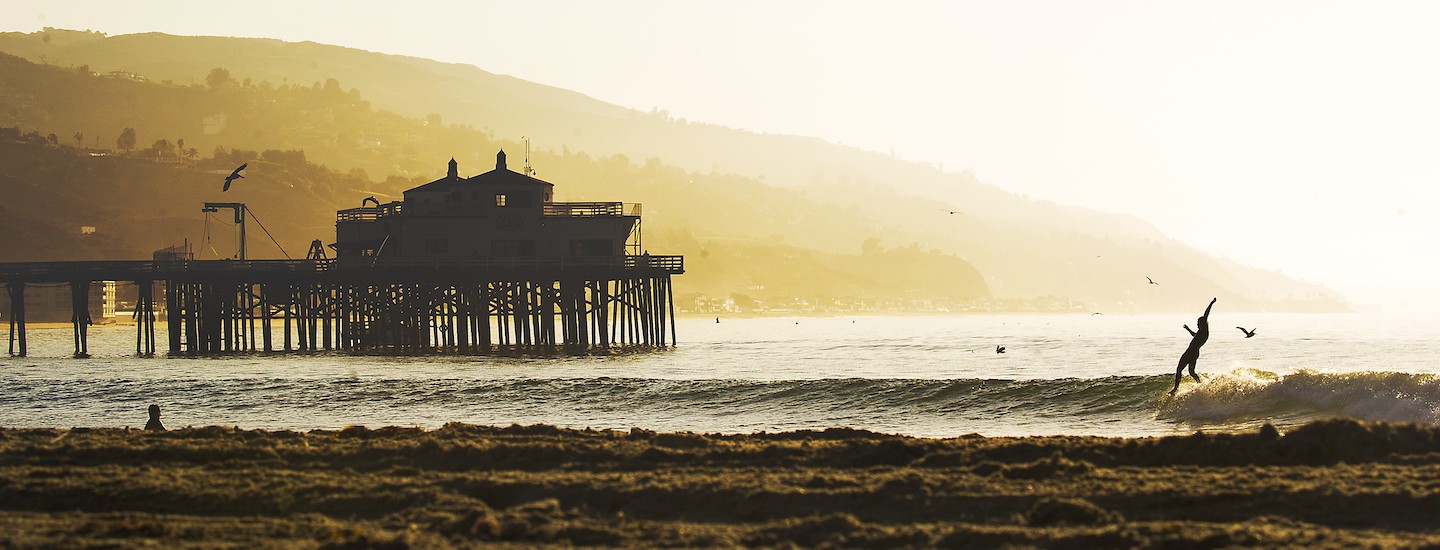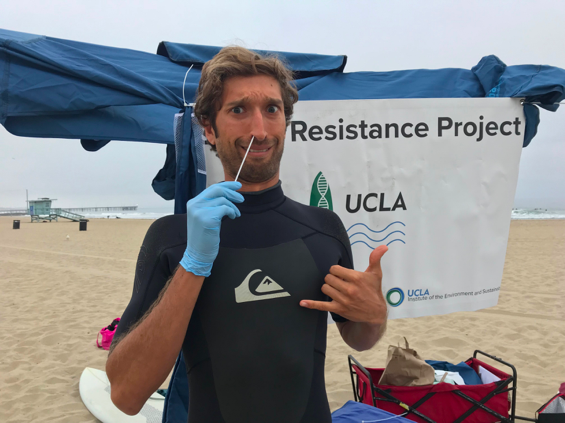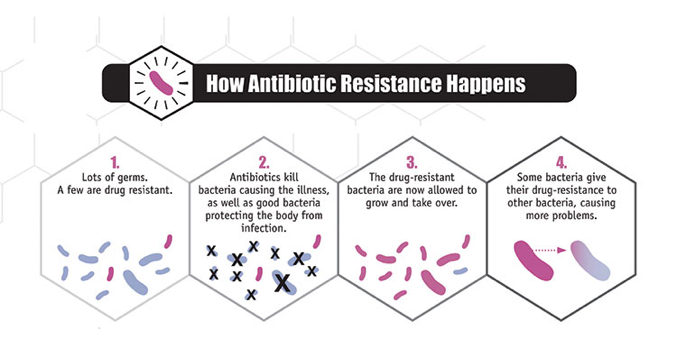
Banner image by Dylan Gordon
The Surfrider Foundation is excited to collaborate with UCLA on a new surfer antibiotic resistance study, taking place at popular surf breaks in Los Angeles County.
The Surfer Resistance Project is part of the PhD Dissertation of UCLA’s Megyn Rugh. Megyn is working with her advisor, Dr. Jenny Jay, as well as a group of dedicated UCLA undergraduates to collect, test, and process samples collected from surfers before and after a surf at LA beaches.
 Figure 1. Surfer and Surfrider volunteer Michael Doshi gets his nose swabbed at a beach in LA County before paddling out for a surf. Image by Megyn Rugh, 2018.
Figure 1. Surfer and Surfrider volunteer Michael Doshi gets his nose swabbed at a beach in LA County before paddling out for a surf. Image by Megyn Rugh, 2018.
While many of us see the ocean as a pristine, majestic playground, the truth of the matter is that coastal waters in urban areas can be extremely polluted, and pose a health risk for ocean recreationists, especially when they are completely submerged (like surfers). This can include exposure to harmful bacteria or viruses, called pathogens, as well as chemicals that get released into the marine environment.
Unfortunately, recreational exposure to polluted waterways is rather common in the US. There are an estimated 90 million recreational water illnesses every year, costing the US economy roughly $2.9 billion in medications, sick leave, hospital visits and more.
The health impacts from recreating in polluted water are often relatively mild, like cold and flu symptoms from gastrointestinal illnesses; and eye, ear, and nose infections. However, impacts can be extremely severe and even life threatening depending on the type of pathogen (e.g. there have been cases of cholera, vibrio, hepatitis, and worse). Additionally, if the recreationist has a compromised immune system (often the case in children or the elderly), or if a bacteria pathogen is unable to be cured by antibiotics, something known as antibiotic-resistance, health threats can be deadly and widespread. As Megyn explains, “antibiotic resistance is increasingly recognized as one of the foremost health challenges of the next generation, and can result in the creation of ‘superbugs’.”
 Figure 2. How Antibiotic Resistance Happens. “Antibiotic resistance occurs when bacteria develop the ability to defeat the drugs designed to kill them,” (CDC, 2017). Image by Megyn Rugh, 2018.
Figure 2. How Antibiotic Resistance Happens. “Antibiotic resistance occurs when bacteria develop the ability to defeat the drugs designed to kill them,” (CDC, 2017). Image by Megyn Rugh, 2018.
This is why Surfrider volunteers are out at the beach testing water quality through our Blue Water Task Force (BWTF) program. Similar to beach monitoring programs run by local health agencies, Surfrider’s 45+ BWTF labs are testing for fecal indicator bacteria that point to the presence of fecal pollution in the water (human or animal waste) and the associated human health risk from potential exposure. Most regulatory agencies that monitor beach water quality do not have the resources or expertise to test for the explicit pathogenic strains of bacteria or viruses that actually cause these health threats. Fortunately, Megyn’s lab at UCLA has the tools, resources, and expertise to identify distinct pathogens.
Megyn is testing whether surfers are getting colonized or infected by two particularly harmful and wide-spread antibiotic resistant pathogens, MRSA (methicillin-resistant Staphylococcus aureus) and VRE (Vancomycin-resistant Enterococcus), through environmental exposure when surfing at Los Angeles beaches. The Los Angeles coastline happens to be an area that experiences significant stormwater runoff from urbanized coastal areas, direct discharge from wastewater treatment plants, and potential runoff from agricultural sites; which are all potential sources of MRSA and VRE.
The study aims to answer these specific research questions:
-
Are surfers getting colonized or infected by MRSA or VRE by surfing in Los Angeles?
-
Do surfers’ microbiomes have different levels of antibiotic resistant genes compared to the microbiomes of people that don’t go in the ocean?
-
What types of antibiotic resistant genes are common LA beach pollutants?
-
How does this environmental exposure to antibiotic resistant genes (ARG) affect surfers’ health?
Along with several other organizations, the Surfrider Foundation is acting as a client for this study, and will use the results to help educate surfers and LA County recreationists about the potential threats when surfing in polluted waterways. There is also the potential to expand this study to other areas, as antibiotic pathogens have been identified at coastlines across the U.S. Pending results, Surfrider hopes to work with UCLA and LA City officials to conduct source identification and ultimately halt the additional flow of antibiotic resistant pathogens into our marine environment.
Surfrider’s LA Chapter is helping to coordinate surfer volunteers for this study. If you are an avid surfer in LA County interested in participating, please reach out to Graham Hamilton at ghamilton@la.surfrider.org.
Learn more about the Surfer Resistance Project here.
